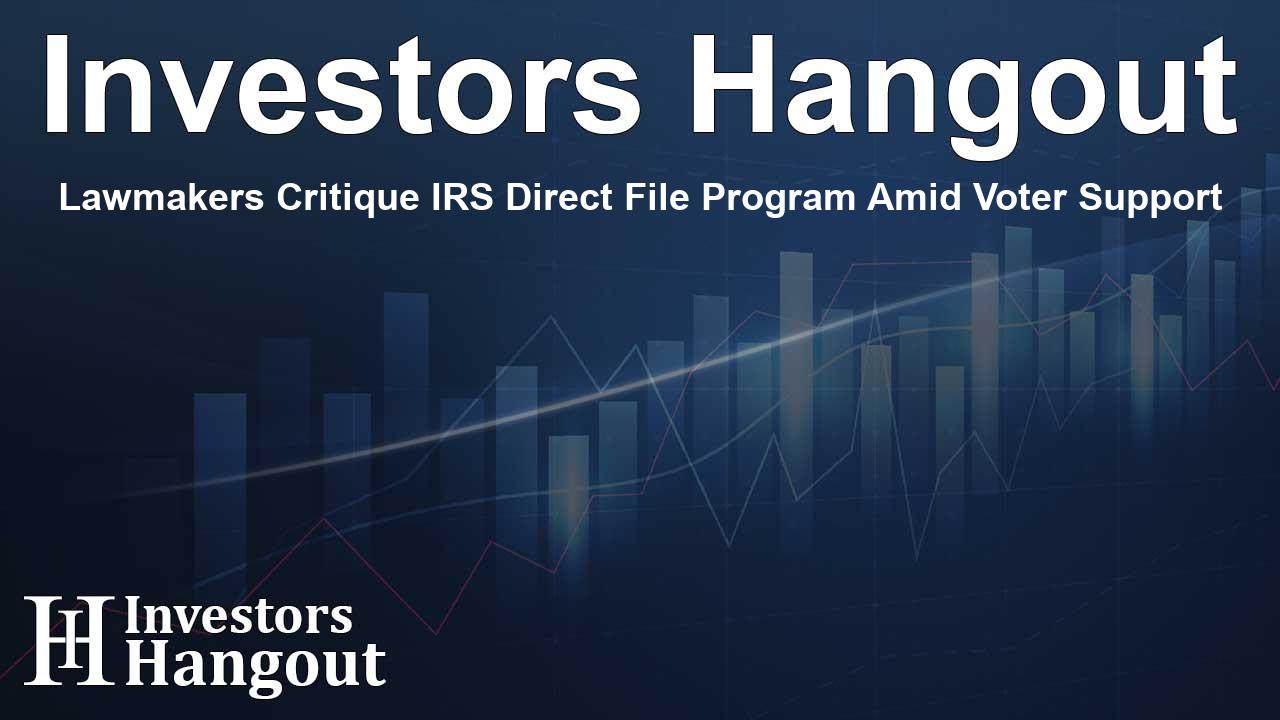Lawmakers Critique IRS Direct File Program Amid Voter Support

Lawmakers Challenge the IRS Direct File Initiative
Recent discussions have highlighted a critical viewpoint from lawmakers regarding the IRS Direct File program. Representative Jason Smith has expressed strong support for legislation aimed at discontinuing this initiative, which offers a free federal tool enabling Americans to file taxes online without incurring costs from private firms.
The Context of Tax Filing in America
The sentiment echoed by Smith emphasizes a growing concern that the IRS should not act as taxpayers' preparer and auditor. Although some lawmakers voice opposition to the program, it is essential to recognize that a significant portion of the public sees value in this service. In fact, various polls indicate that many taxpayers appreciate having a streamlined mechanism for tax filing.
Understanding the Support for Direct File
Despite the critique from some government officials, early feedback indicates considerable support for the IRS Direct File program. According to a recent survey, an impressive 82% of voters across various political spectrums favor expanding this service to all Americans. The positive feedback includes support from constituencies of different beliefs, with significant numbers of Republicans, Independents, and Democrats endorsing the initiative.
The Genesis and Impact of the Direct File Program
Originally launched with funds from the Inflation Reduction Act, the Direct File program commenced as a pilot in 12 states. It quickly expanded to a broader deployment later, reaching 32 million eligible users. Advocates of the program laud it for being secure, simple, and always free, positioning it as a compelling choice for millions of American taxpayers.
Moreover, users have reported positive experiences, with many stating they completed their tax filing in less than an hour. A significant financial impact was also noted, as the tool purportedly saved taxpayers approximately $5.6 million in fees in its initial rollout.
Voices in Favor of Maintaining Direct File
Kitty Richards, a senior fellow at a respected economic policy group, has articulated that Direct File represents an efficient governmental operation. Richards argues that taxpayers should not be burdened with high fees from for-profit entities, especially when a government solution is available.
Concerns from Critics
Conversely, criticism has emerged from various quarters, suggesting that ending the Direct File program would benefit large companies that thrive on the complexity of tax preparation services. Critics assert that dismantling this program would not only hinder competition but potentially increase costs for everyday Americans.
Political Dynamics Surrounding Tax Filing
The political landscape surrounding the IRS Direct File program continues to evolve. Notable voices, such as Senator Ron Wyden, label the initiative a significant success, removing unnecessary intermediaries in the tax process. Allegations have been made against political figures for prioritizing lobbyist interests over beneficial programs for American families.
Furthermore, recent conversations regarding the program's future have included whistleblower accounts from staff transitions indicating reduced workforce needs moving forward.
The Role of Influential Figures
Prominent figures in the tech industry, such as Elon Musk, have also made their voices heard regarding the IRS's activities. Musk characterized the Direct File development team as having been 'deleted,' raising eyebrows about the government’s intentions in managing tax payment systems.
The Future of the IRS Direct File Program
Ultimately, supporters of the Direct File program advocate for its continuation, asserting it fulfills a crucial role in simplifying tax preparation for everyday Americans. The debate is ongoing, and as discussions progress, it remains to be seen how policymakers will balance corporate interests and public support in shaping the future of tax filing in the U.S.
Frequently Asked Questions
What is the IRS Direct File program?
The IRS Direct File program is a free online tool that allows taxpayers to file their taxes without fees from private companies.
Why are some lawmakers opposed to the program?
Some lawmakers believe that the IRS should not act as a tax preparer, asserting that it creates unnecessary government involvement in personal finance.
How much support does Direct File have among voters?
Polling indicates that about 82% of likely voters support expanding the Direct File program to all Americans.
What benefits does Direct File provide users?
Direct File simplifies the tax-filing process and has reportedly saved taxpayers large sums in fees.
What are the implications of ending the Direct File program?
If ended, critics argue it could harm many taxpayers by increasing costs and reducing efficiency in tax filing processes.
About The Author
Contact Dominic Sanders privately here. Or send an email with ATTN: Dominic Sanders as the subject to contact@investorshangout.com.
About Investors Hangout
Investors Hangout is a leading online stock forum for financial discussion and learning, offering a wide range of free tools and resources. It draws in traders of all levels, who exchange market knowledge, investigate trading tactics, and keep an eye on industry developments in real time. Featuring financial articles, stock message boards, quotes, charts, company profiles, and live news updates. Through cooperative learning and a wealth of informational resources, it helps users from novices creating their first portfolios to experts honing their techniques. Join Investors Hangout today: https://investorshangout.com/
The content of this article is based on factual, publicly available information and does not represent legal, financial, or investment advice. Investors Hangout does not offer financial advice, and the author is not a licensed financial advisor. Consult a qualified advisor before making any financial or investment decisions based on this article. This article should not be considered advice to purchase, sell, or hold any securities or other investments. If any of the material provided here is inaccurate, please contact us for corrections.
